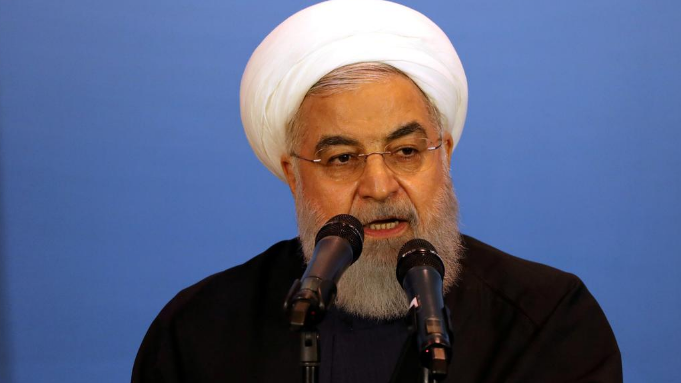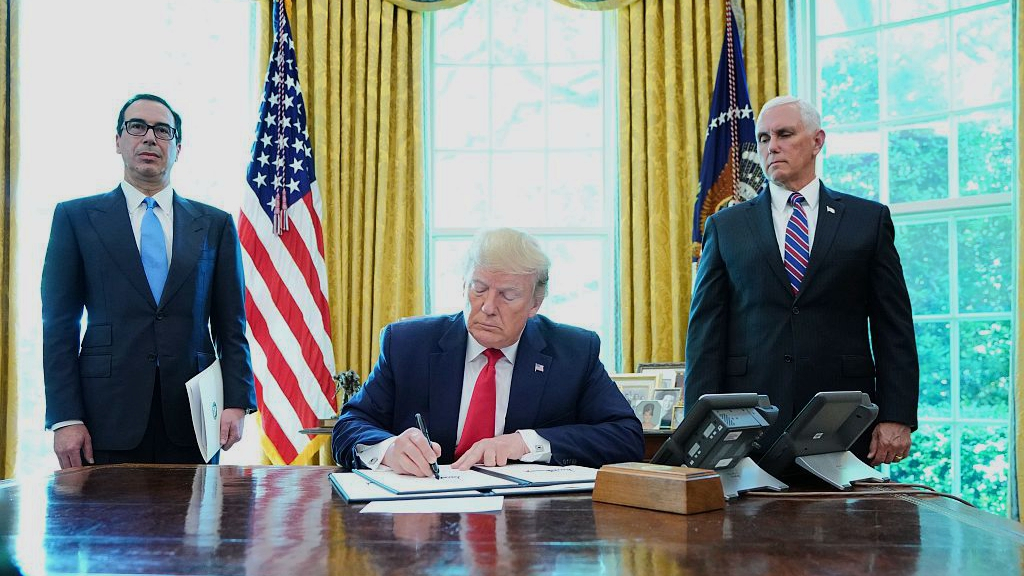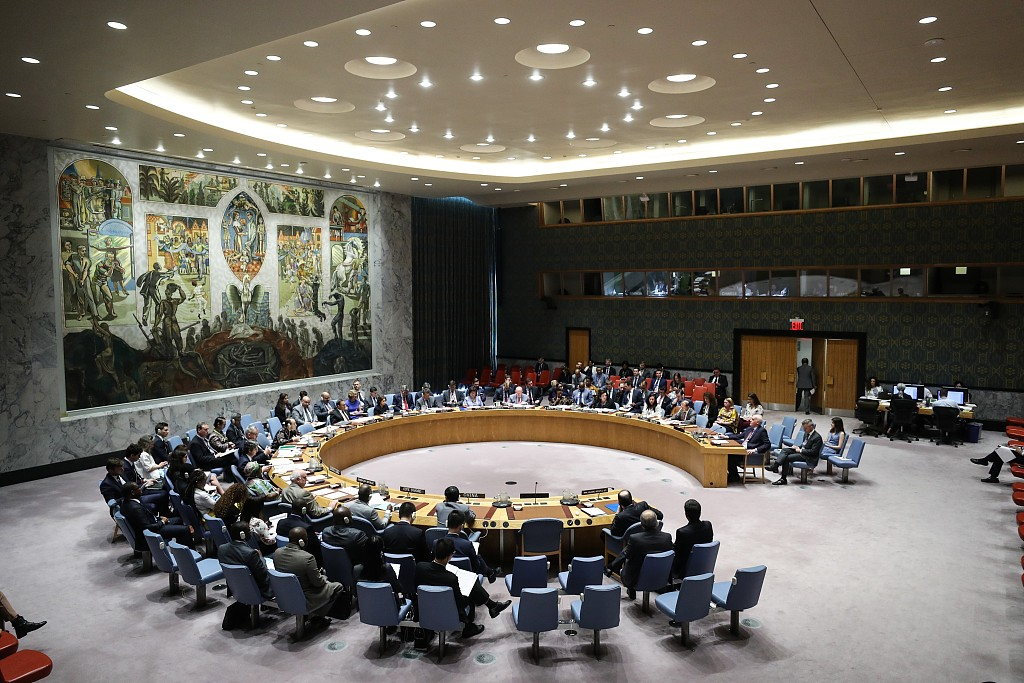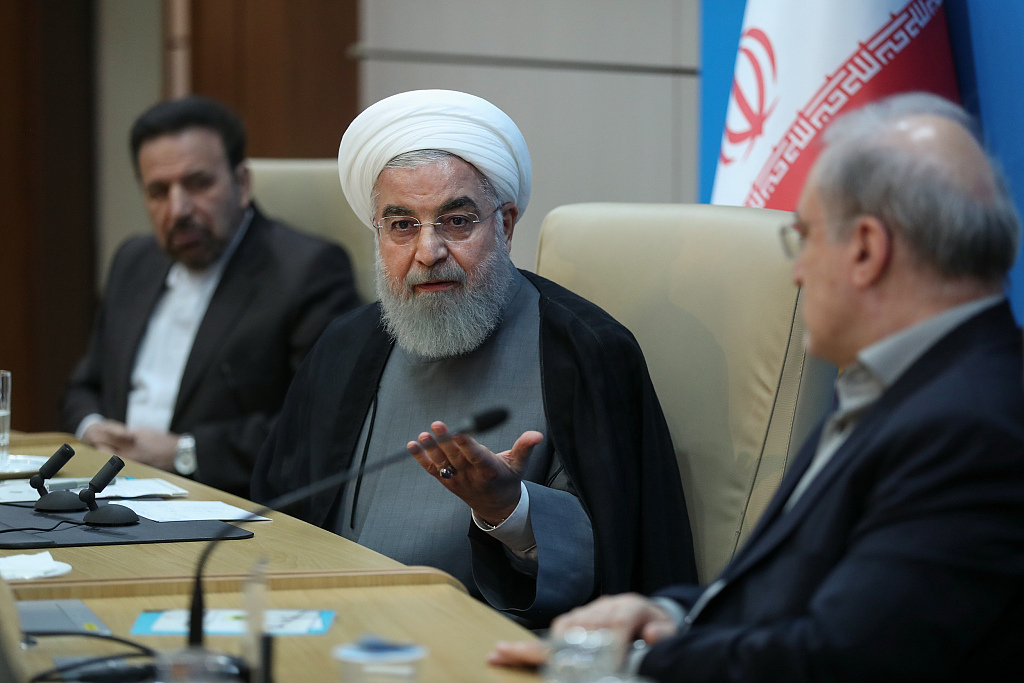
Iran is still short of the maximum amount of enriched uranium it is allowed to have under its deal with major powers but it is on course to reach that limit at the weekend, the latest data from U.N. nuclear inspectors shows, diplomats say.
On Wednesday, the U.N. nuclear watchdog verified that Iran had roughly 200 kilograms of low-enriched uranium, below the deal’s 202.8 kilogram limit, three diplomats who follow the agency’s work said.
Two of the diplomats said Iran was producing at a rate of around a kilogram a day, suggesting it will not make good on its announcement that it would reach the limit on Thursday, but it could go over the line soon after a meeting with other signatories of the deal in Vienna on Friday that is aimed at saving the accord.

Iranian President Hassan Rouhani speaks during a meeting with tribal leaders in Kerbala, Iraq, March 12, 2019. /Reuters Photo
U.S. President Donald Trump said on Wednesday that he was "not talking boots on the ground" should he take military action against Iran and that he had "unlimited time" to try to forge an agreement with Tehran.
Iran suggested it was just one day from breaching a limit in the 2015 nuclear deal that restricted its stockpile of uranium, a move that would pressure European countries aiming to be neutral to pick sides.
The fate of the multilateral nuclear deal, under which Iran agreed to curbs on its nuclear program in return for relief from economic sanctions, has been at the heart of the U.S.-Iran dispute which took on a military dimension in recent weeks.
Last week Iran shot down a U.S. drone it said was in its air space, which Washington denied. Trump called off retaliatory air strikes at the last minute, saying too many people would have died. Washington also accused Tehran or its proxies of attacks in May and June on six tankers in the Gulf region, which Iran denies.

U.S. President Donald Trump signs a decree to impose sanctions against Iran's supreme leader at the White House, June 24, 2019. /VCG Photo
Asked on Fox Business Network if a war was brewing, Trump replied: "I hope we don't but we're in a very strong position if something should happen."
"I'm not talking boots on the ground," Trump said. "I'm just saying if something would happen, it wouldn't last very long."
Speaking later at a gathering of religious conservatives, the U.S. president talked about whether there could be a new agreement with Iran, suggesting he could live without one.
"If it doesn't happen, that's fine with me," Trump said. "I have unlimited time, as far as I'm concerned."
Trump last year unilaterally withdrew from the nuclear deal with Iran struck by his predecessor President Barack Obama, arguing that it did not go far enough to restrict Iran's nuclear and missile programs and other activities in the Middle East.
He has since re-imposed U.S. economic sanctions on Iran, including taking the unprecedented step in May of trying to drive Iran's oil exports to zero.
'Little gestures to reduce tensions'

The member countries of UN security council hear a report on the Joint Comprehensive Plan of Action of the Iranian nuclear issue in New York, United States, June 26, 2019. /VCG Photo
Iran warned the UN Security Council on Wednesday that it would no longer be burdened with preserving the pact, originally struck by Iran and Britain, China, France, Germany, Russia and the United States. European states pushed Tehran to stick with the agreement because there was no peaceful alternative.
"Iran alone cannot, shall not and will not take all of the burdens any more to preserve the JCPOA," Iran's UN Ambassador Majid Takht Ravanchi told the 15-member Security Council, using the acronym for the deal's formal name, the Joint Comprehensive Plan of Action.
U.S. allies warn that an increase in tensions could accidentally lead to war.
Iran and world powers including the United States who struck the nuclear pact needed to find a way back into talks, French President Emmanuel Macron said on Wednesday.
"I believe the escalation, sanctions on top of sanctions, provocations, the military build-up, is extremely dangerous because it could ignite the region, it could lead to over-reactions," he told Japanese broadcaster NHK before a G20 summit in Osaka.
"When confidence is lost, you need little gestures to reduce tensions."
'Obliteration'

Iranian President Hassan Rouhani (C) said the new sanctions imposed by U.S. proved that the United States is not interested in negotiations, June 25, 2019. /VCG Photo
Although the United States and Iran both say they do not want war, last week's aborted U.S. strikes have been followed by menacing rhetoric on both sides. On Tuesday Trump threatened the "obliteration" of parts of Iran if it struck U.S. interests. President Hassan Rouhani, who normally presents Tehran's mild-mannered face, called White House policy "mentally retarded."
The standoff creates a challenge for Washington which, after quitting the nuclear deal against the advice of European allies, is now seeking their support to force Iran to comply with it.
Over the past few weeks Iran has set a number of deadlines for European countries to protect its economy from the impact of U.S. sanctions or see Tehran reduce compliance with the deal.
European nations have tried to save the deal by maintaining some of its economic benefits despite U.S. sanctions. So far they have failed, with Iran largely shut from oil markets and all major European companies cancelling plans to invest.
Senior British, French, German and U.S. diplomats meet in Paris on Thursday, and senior officials from the six nations still in the deal gather in Vienna on Friday for talks that may explore whether the deal can be salvaged through diplomacy.
Iran says it would be Washington's fault if it exceeds the 300 kg stockpile threshold. The 2015 deal allows Iran to sell excess uranium abroad to keep its stockpile below the limit, but such sales have been blocked by U.S. sanctions.
(With input from Reuters)

Copyright © 2018 CGTN. Beijing ICP prepared NO.16065310-3
Copyright © 2018 CGTN. Beijing ICP prepared NO.16065310-3